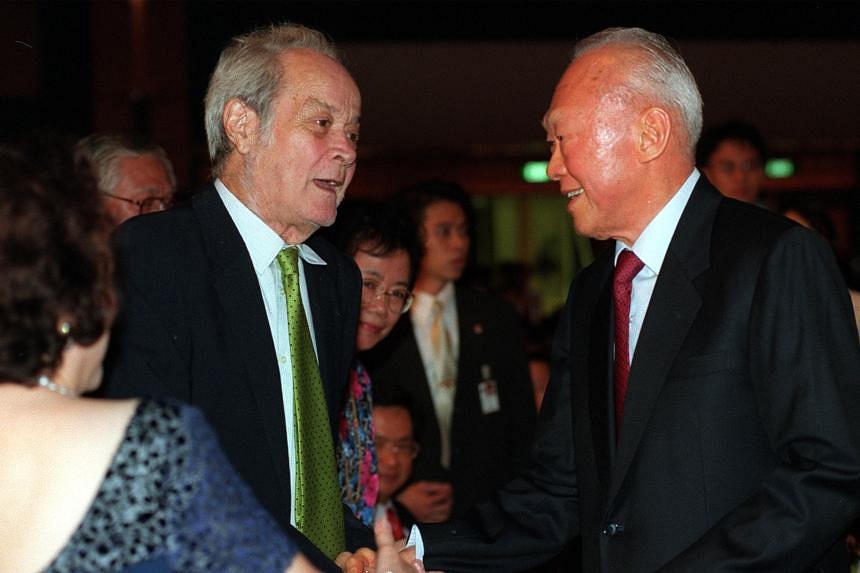- Joined
- Oct 30, 2014
- Messages
- 36,768
- Points
- 113

SINGAPORE – When Mr E.W. Barker, who became Singapore’s first law minister in 1964, accompanied founding prime minister Lee Kuan Yew to Kuala Lumpur for parliament sittings in the 1960s, his family was concerned he might be unable to come back home.
His daughter, Ms Carla Barker, told The Straits Times on June 5: “There was always the worry that maybe they wouldn’t come back”, adding that there was concern that the Singapore leaders would be arrested over their views that were unpalatable within the Malaysian government.
Disagreements were intense about what it meant to be a Malaysian citizen, and the equal rights of citizens of different races and religions.
Singapore and Malaysia subsequently separated in 1965.
Ms Barker, 72, who was then in her early teens, said: “I was old enough to understand what was going on. My father used to talk to us.
“He used the word ‘dangerous’... We knew it was a risky time,” she said of Mr Barker, who was law minister from 1964 to 1988.
Ms Barker is among the family members and close associates of Singapore’s founding leaders to be interviewed by a project team as part of the development of the Founders’ Memorial – an institution dedicated to Singapore’s pioneers and the values they exemplified – and the curation of its galleries.
She told ST at a reception following the ground-breaking ceremony for the memorial – to be located in Gardens by the Bay’s Bay East Garden – that while the situation in the early 60s was uncertain, the Barker family was “too young to be scared”.
“My mother and father were very positive,” she said. “They were young – as Lee Kuan Yew was – and they were very idealistic. And they were very confident, as all young people are.”
In spite of this, Ms Barker said her father always made preparations in case he did not return. “He didn’t let us be frightened. He said, ‘Don’t worry about it, I have a little money put by. Mummy can look after you’,” she said.
Ms Barker said her father also made time for family and his four children amid the challenges of governing a fledgling nation. She recalls playing badminton in their garden, board games in the evenings, and family holidays in a Changi chalet.
“We were never allowed to go into the sea unless he was sitting and watching us,” she said.

Also present at the reception on June 5 was Madam Tan Siok Sun, 75, the daughter-in-law of Dr Goh Keng Swee, who held various portfolios during his political career from 1959 to 1984.
She said her conversations with Dr Goh involved discussions over how he led various ministries – he had been the minister for finance, defence and education at various points.
“Finance was easy; he was an economist,” she said, adding that she asked him how he set up the Singapore Armed Forces without prior experience. He told her: “Get good advice. Singapore’s a young country – whatever we want to do, some other countries much older than us would have gone through it. Why reinvent the wheel? You’re wasting your time.”
She said the Education Ministry portfolio was the most challenging for him as he was frustrated that he could not tell if his policies were effective. “He understood that whatever new policies you implement, it will only be seen to be successful two generations, three generations later. So he said, ‘How do I know whether what I’m doing is right?’,” said Madam Tan.
She is in favour of the memorial’s values-driven narrative approach as this recognises not just the founding leaders, but independent Singapore’s founding generation and the values they collectively demonstrated, she said.
“The founding fathers were committed to building a better society for each generation, so they believed in thrift, saving up, building up the reserves,” she said, adding that Dr Goh was himself thrifty and that he “would wear his shoes down until there were holes in them”.
She said: “Singapore’s making has a cast of thousands. It’s not just the founding fathers, important though they are, there were many Singapore citizens who were committed and contributed to what Singapore is today.”
Among those who have contributed to the Founders’ Memorial’s collection of more than 900 artefacts and stories thus far is Mr Leng Ng Tai, 77, who donated tools he had made while studying and working at the British naval dockyard in Sembawang in the 1960s.

Mr Leng had taken on a five-year apprenticeship at the dockyard when he was 15 years old at the advice of a primary school teacher after realising that his parents did not have enough money to fund his education past secondary school.
Apprentices received education – they were taught by British military officers – and were also trained to work in the dockyard servicing warships.
“Almost all of us apprentices came from poor families. We couldn’t afford to go for further studies,” he said.
“The moment we got an apprenticeship, we received an allowance and most of the allowance contributed to the family,” he added.
“We strived in the early days, and when we gained education and work education we thrived in the field we were employed,” said Mr Leng, who worked for Shell for more than five decades after leaving the dockyard in the late 1960s.
“We started with nothing, but we wanted to, and continued to, progress,” he said, citing fellow apprentices who took up jobs in various industrial fields after the withdrawal of the British military from Singapore.
https://www.straitstimes.com/singap...from-kl-parliament-sittings-before-separation
